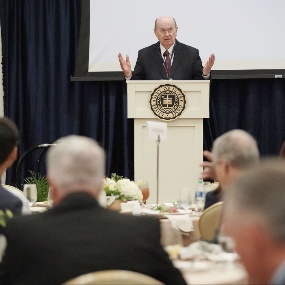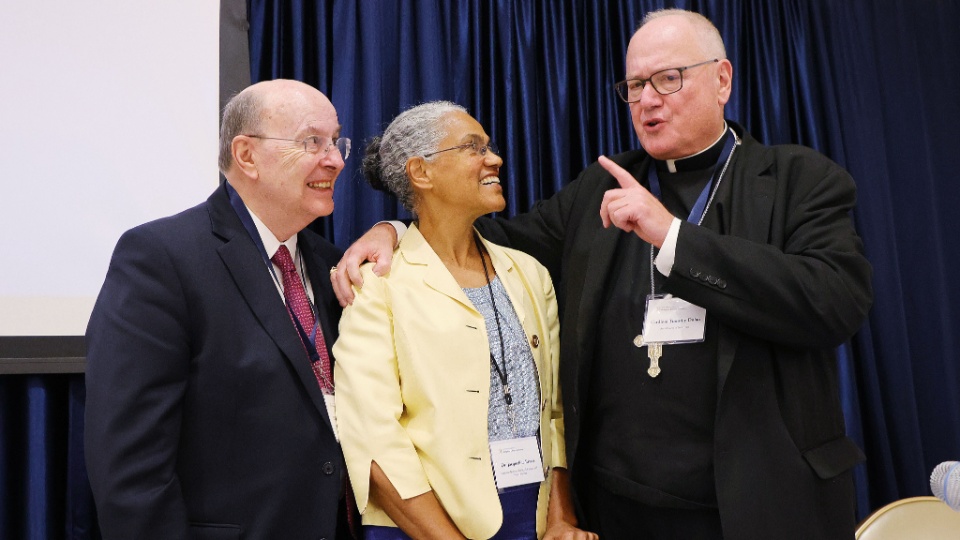The setting Monday was fitting for a panel on interfaith cooperation. An Apostle of The Church of Jesus Christ of Latter-day Saints joined a Catholic cardinal, a Pentecostal scholar and a rabbi at a Catholic university in the United States for its inaugural religious freedom summit.
His Eminence Cardinal Timothy Dolan, the archbishop of New York since 2009, delivered the keynote at the University of Notre Dame’s first Religious Liberty Summit. Three others then spoke: Elder Quentin L. Cook of the Quorum of the Twelve Apostles; Dr. Jacqueline Rivers, a Pentecostal and the director of the Seymour Institute for Black Church and Policy Studies; and Rabbi Meir Soloveichik of Congregation Shearith Israel in New York.
-
- Jeffrey-Allred---Elder-Cook-Notre-Dame_ja_2319.jpg
- Allred---Elder-Cook-Notre-Dame_ja_2359.jpg
- Allred---Elder-Cook-Notre-Dame_ja_1691.jpg
- Allred---Elder-Cook-Notre-Dame_ja_0565.jpg
- Allred---Elder-Cook-Notre-Dame_ja_0773.jpg
- Jeffrey-Allred---Elder-Cook-Notre-Dame_ja_1595.jpg
- Allred---Elder-Cook-Notre-Dame_ja_2684.jpg
- Allred---Elder-Cook-Notre-Dame_ja_3398.jpg
- Jeffrey-Allred---Elder-Cook-Notre-Dame_ja_2959.jpg
| Temple Square is always beautiful in the springtime. Gardeners work to prepare the ground for General Conference. © 2012 Intellectual Reserve, Inc. All rights reserved. | 1 / 2 |
Elder Cook said that too often today the good of religion is overlooked or viewed negatively. Borrowing a phrase from one Jewish leader, he lamented how many today are “tone deaf to the music of faith.” Thus, the Apostle spoke about two of the blessings that flow from the religious impulse: accountability and good works.
“Accountability to God for our relationships with each other is a powerful force for good and strongly supports democracy,” Elder Cook said. “Being accountable sustains and blesses the values that are most important for societal unity.”
Elder Cook noted how religion has moved religious people, such as William Wilberforce (Great Britain) and the Quakers (early America) to abolish slavery. He also pointed to the animating force of faith in people such as Martin Luther King Jr., who promoted civil rights in the United States in the 1960s.
Elder Cook said some people claim that upholding the principles embedded in the U.S. Constitution (such as religious freedom) does not square with protecting the rights of minority groups. He pushed back, saying that support of the Constitution and advocacy for “strong, peaceful efforts to overcome racial and social injustice are not opposites. Eliminating racism at all levels needs to be accomplished. And, historically, religious conviction has been one of the great forces in accomplishing that goal.”
Helping the world better recognize the good that people of faith do must be a joint project, Elder Cook said.

Allred---Elder-Cook-Notre-Dame_ja_2359.jpg
Elder Quentin L. Cook speaks at a religious freedom summit at the University of Notre Dame on Monday, June 28, 2021.All rights reserved.“My plea today is that all religions work together to defend faith and religious freedom in a manner that protects people of diverse faith as well as those of no faith,” the Apostle said. “Catholics, Evangelicals, Jews, Muslims, Latter-day Saints and [people of] other faiths must be part of a coalition of faiths that succor, act as a sanctuary and promulgate religious freedom across the world. We must not only protect our ability to profess our own religion, but also protect the right of each religion to administer its own doctrines and laws.”
He challenged summit attendees to “tack against the prevailing winds of disbelief and division. You will know best how to accomplish this and stand as a beacon of belief and unity in a world that often devalues both.”
A Summary of the Remarks from Cardinal Dolan, Dr. Rivers and Rabbi Soloveichik
Cardinal Timothy Dolan
Cardinal Dolan shared four points to encourage believers to correct the prevailing narrative that the defense of religious freedom is an “oppressive, partisan, right wing, unenlightened crusade.”
- We advocate for religious freedom “not primarily because we’re believers but because we’re Americans.”
- The defense of religious liberty is, historically, “considered part of the movement that is usually called progressive and reforming.”
- We cherish religious freedom not to protect government from religion but to protect the right to freely exercise religion.
- Our culture’s view of religion has shifted from encouragement of religion in the public square to “outright antagonism to any voice inspired by faith.”
“All we want to do, along with Cecil Calvert and Roger Williams and William Penn and John Carrol is to be left alone,” Cardinal Dolan said. “All we want, along with the parson patriots, Jonathan Edwards, Brigham Young, the abolitionists, William Jennings Bryan, Cesar Chavez, Dorothy Day, Rabbi Abraham Joshua Heschel and the Rev. Martin Luther King is the freedom to carry the convictions of a faith-armed conscience into our public lives.”

Allred---Elder-Cook-Notre-Dame_ja_2684.jpg
Elder Quentin L. Cook, left, Dr. Jacqueline Rivers, middle, and Cardinal Timothy Dolan, right, spoke Monday, June 28, 2021, at a religious freedom summit at the University of Notre Dame on June 28, 2021.All rights reserved.Dr. Jacqueline Rivers
Dr. Rivers spoke about religious freedom from the perspective of the Black church. Religious freedom has been, she said, both a burden and a blessing for African Americans. For example, religious freedom was used both to perpetuate slavery and promote abolition.
Black Christians, Dr. Rivers said, “have powerful, active passionate outpourings of faith.” But when it comes to religious freedom, they are a major untapped resource, “a sleeping giant,” because some of those most invested in religious liberty have opposed the cause of racial justice.
“If we can overcome some of these barriers and fully engage the Black church, we can do so much to advance the cause of religious freedom,” she said. “We have to have the freedom to live in accordance with our faith. And those who are of no faith, at the same time, have to have the freedom to live in accordance with our conscience. We have to rouse the sleeping giant.”
Rabbi Meir Soloveichik
Sharing insight from a Christian friend of his, Rabbi Soloveichik said “government pressure on one’s religious practices is entirely to be expected, and that one should not immediately go into mourning when one experiences pressure.” This insight also encourages Christians to “get over the shock of realizing that not everyone is going to be nice to them all the time.”
To be a person of faith in the modern world, Rabbi Soloveichik said, “is the challenge of learning to be stranger and neighbor in society.” It is a challenge to be welcomed, he said, because “it has brought us faith communities closer together and allowed us to learn from each other. … Even as aspects of our own age have indicated that the going might indeed get tough, nevertheless, in the process we communities of faith have also found each other. And that at least is something to celebrate.”